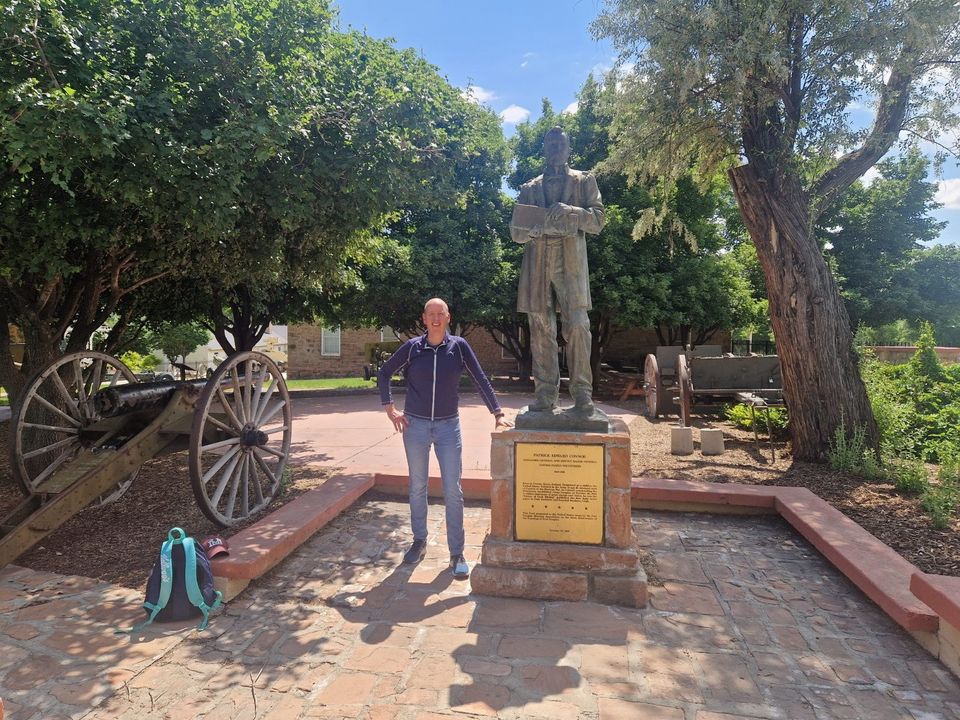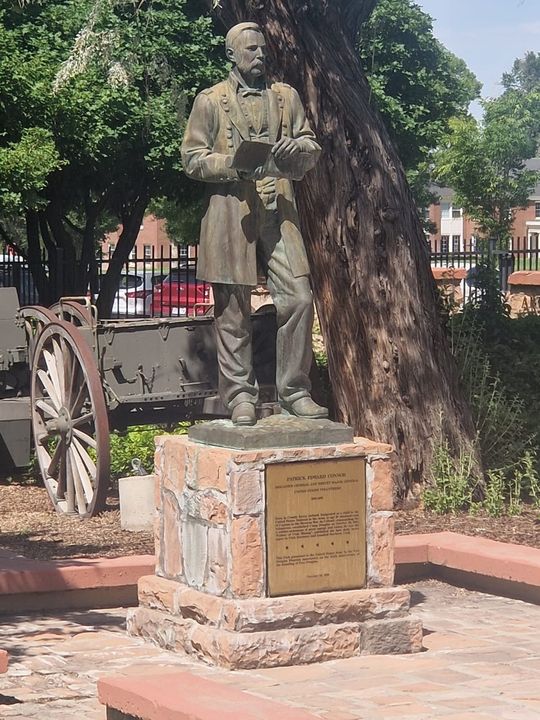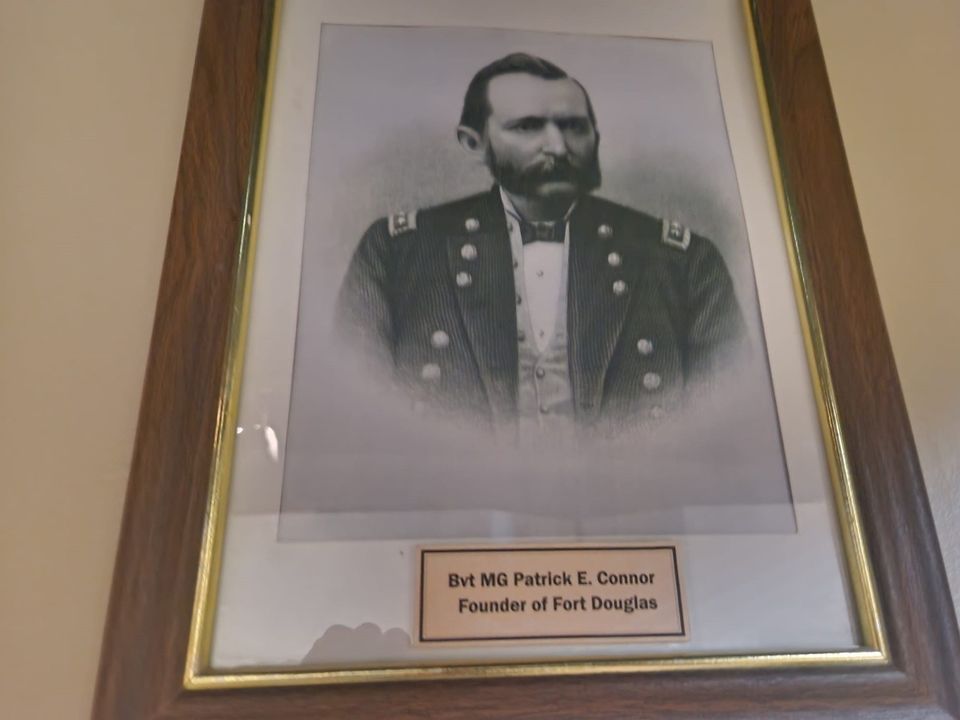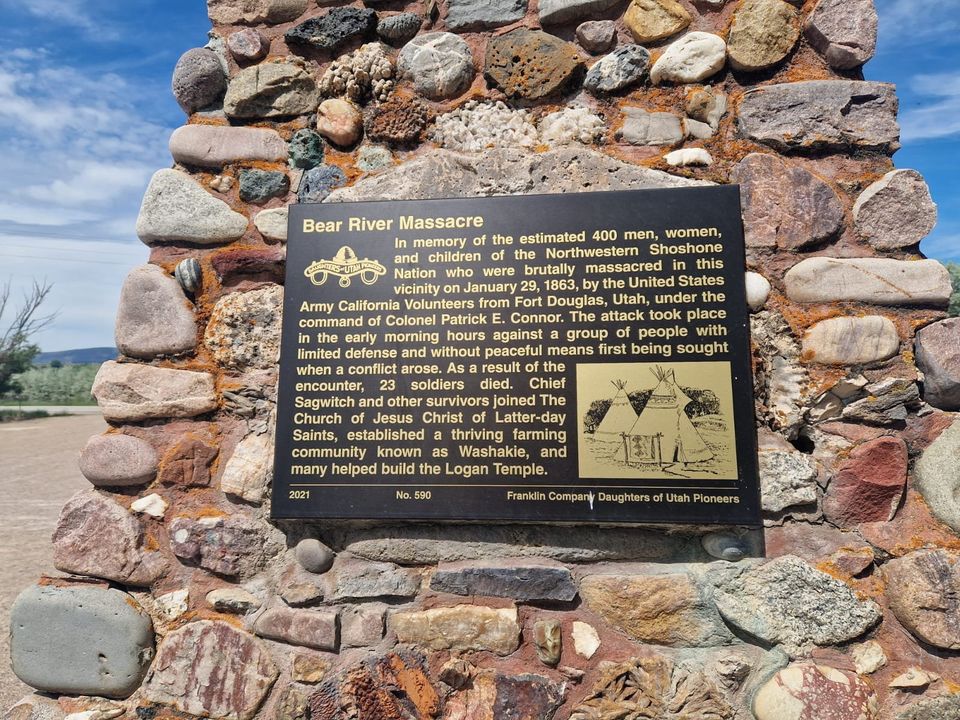Kerry’s native American killer: Documentary examines link to largest US Indian massacre
Few, if any, have heard of west Kerry man Patrick O’Connor who led his troops into the largest massacre of Native Americans in US history

Jerry O'Sullivan with the statue to Patrick O'Connor from Kerry who led the largest massacre of native Indians. The Kenmare journalist has a new documentary on Spotify telling the story of the West Kerry man
Sinead KelleherKerryman
Wed 30 Aug 2023
There is a certain romanticism about the Irish who fled to America and the belief that they all went on to live great and virtuous lives but there are others who fled Ireland and played a significant role in the dark history of the US.
Few, if any, have heard of west Kerry man Patrick O’Connor who led his troops into the largest massacre of Native Americans in US history on January 29, 1863. Over 400 men, women and children of the North West Band of the Shoshone Nation were killed at Bear River, near what is today Preston, Idaho. O’Connor led the California Volunteers who had been stationed at Port Douglas.
The eldest son of Thomas O'Connor and Mary Sullivan, he was born in 1820 in Ballyferriter and the family emigrated to the US in the 1830s when Patrick was 12 or 16 (1832 or 1836), bound for New York in pre-famine times.
But who was Patrick O’Connor and what did he do? Award-winning journalist Jerry O’Sullivan from Kenmare has put together a documentary on the extraordinary story of this Kerry man to tell the tale of a darker side of our emigrant history.

The statue of Kerry man Patrick O'Connor on the grounds of the Fort Douglas Military Museum.
‘Gloryhunter Kerry Indian Killer’ is now on Spotify and tells the chilling history of that fateful day and highlights the Kerry man behind the massacre of so many native Indians.
Jerry O’Sullivan, well-known presenter of Kerry Today, travelled to Salt Lake City in Utah to learn more about Mr O’Connor and what his role was that day.
Speaking to historians as well as members of the Shonshone tribe, Jerry has a tale to tell that shines a new light on US and Irish history with a story he says must be told.
"For many Irish-Americans, history has a romanticism about it, ‘the tired and poor huddled masses’ who left for American and rose up and out of the tenements of New York. What is less celebrated is the dark side of that story, like the actions of O’Connor,” says Jerry.
While many massacres of that era did make world-wide headlines, the story of Bear River went largely unspoken, partly because it was so bad it was not commemorated later. In fact, it took some time for its description to be changed from a battle to a massacre via Congress.
In fact, the land on which the bloodbath occurred is now back in the hands of that tribe and there are plans for an interpretative centre.
"It was so bad that even the Mormons [the established group there at the time] did not talk about it and Mr O’Connor was not treated as a hero. It was buried to an extent,” explains Jerry.
On arrival in the US, Patrick O’Connor epitomised the ‘American Dream’ and truly believed in being an American first, in joining the army and making a fortune in the gold rush. Anyone who got in the way of that dream for Patrick should be removed and that included native Americans. He too despised the Mormons seeing them as ‘anti-American’.

A photo of General Patrick Edward Connor (Patrick O'Connor) who was from Kerry and who led a massacre of Native American Indians in Idaho.
Jerry first came across the story of Patrick O’Connor who changed his name P Edward Connor – he later became General Patrick Edward Connor of the US Army – when researching the controversy surrounding the removal of statues in 2017.
Jerry went in search of Irish with links to atrocities like the slave trade when he came across Mr O’Connor and began researching – a difficult task given the lack of information on the Bear River Battle now the Bear River Massacre – but when he did he found that Mr O’Connor had led his troops into this chilling battle, commanding them to kill all.
"It had emerged this was not a fair fight, it was an out and out massacre and a story that had to be told,” said Jerry.
He got funding from the Sound and Vision broadcasting fund in 2020 but, due to the Covid pandemic, the documentary had to be put on hold. In June of this year Jerry travelled to Salt Lake City in Utah to finalise his research and speak with historians with a wealth of knowledge on the story.

A plaque to mark the Bear River Massacre where 400 men, women and children of the Shoshone tribe were killed by the Army led by Kerry man Patrick O'Connor..
Jerry visited the statue of Mr O’Connor in place in a military cemetery, having been moved quietly from a more prominent position on the University of Utah grounds. The plaque is dedicated to him and the battle and how he was the father of Utah mining but not what he had done to the native Americans in that battle.
Now the story is being told by Jerry through Gloryhunter Kerry Indian Killer. The fascinating documentary aired on Radio Kerry during the August Bank Holiday Weekend and is now on Spotify.
There is a certain romanticism about the Irish who fled to America and the belief that they all went on to live great and virtuous lives but there are others who fled Ireland and played a significant role in the dark history of the US.
Few, if any, have heard of west Kerry man Patrick O’Connor who led his troops into the largest massacre of Native Americans in US history on January 29, 1863. Over 400 men, women and children of the North West Band of the Shoshone Nation were killed at Bear River, near what is today Preston, Idaho. O’Connor led the California Volunteers who had been stationed at Port Douglas.
The eldest son of Thomas O'Connor and Mary Sullivan, he was born in 1820 in Ballyferriter and the family emigrated to the US in the 1830s when Patrick was 12 or 16 (1832 or 1836), bound for New York in pre-famine times.
But who was Patrick O’Connor and what did he do? Award-winning journalist Jerry O’Sullivan from Kenmare has put together a documentary on the extraordinary story of this Kerry man to tell the tale of a darker side of our emigrant history.

The statue of Kerry man Patrick O'Connor on the grounds of the Fort Douglas Military Museum.
‘Gloryhunter Kerry Indian Killer’ is now on Spotify and tells the chilling history of that fateful day and highlights the Kerry man behind the massacre of so many native Indians.
Jerry O’Sullivan, well-known presenter of Kerry Today, travelled to Salt Lake City in Utah to learn more about Mr O’Connor and what his role was that day.
Speaking to historians as well as members of the Shonshone tribe, Jerry has a tale to tell that shines a new light on US and Irish history with a story he says must be told.
"For many Irish-Americans, history has a romanticism about it, ‘the tired and poor huddled masses’ who left for American and rose up and out of the tenements of New York. What is less celebrated is the dark side of that story, like the actions of O’Connor,” says Jerry.
While many massacres of that era did make world-wide headlines, the story of Bear River went largely unspoken, partly because it was so bad it was not commemorated later. In fact, it took some time for its description to be changed from a battle to a massacre via Congress.
In fact, the land on which the bloodbath occurred is now back in the hands of that tribe and there are plans for an interpretative centre.
"It was so bad that even the Mormons [the established group there at the time] did not talk about it and Mr O’Connor was not treated as a hero. It was buried to an extent,” explains Jerry.
On arrival in the US, Patrick O’Connor epitomised the ‘American Dream’ and truly believed in being an American first, in joining the army and making a fortune in the gold rush. Anyone who got in the way of that dream for Patrick should be removed and that included native Americans. He too despised the Mormons seeing them as ‘anti-American’.

A photo of General Patrick Edward Connor (Patrick O'Connor) who was from Kerry and who led a massacre of Native American Indians in Idaho.
Jerry first came across the story of Patrick O’Connor who changed his name P Edward Connor – he later became General Patrick Edward Connor of the US Army – when researching the controversy surrounding the removal of statues in 2017.
Jerry went in search of Irish with links to atrocities like the slave trade when he came across Mr O’Connor and began researching – a difficult task given the lack of information on the Bear River Battle now the Bear River Massacre – but when he did he found that Mr O’Connor had led his troops into this chilling battle, commanding them to kill all.
"It had emerged this was not a fair fight, it was an out and out massacre and a story that had to be told,” said Jerry.
He got funding from the Sound and Vision broadcasting fund in 2020 but, due to the Covid pandemic, the documentary had to be put on hold. In June of this year Jerry travelled to Salt Lake City in Utah to finalise his research and speak with historians with a wealth of knowledge on the story.

A plaque to mark the Bear River Massacre where 400 men, women and children of the Shoshone tribe were killed by the Army led by Kerry man Patrick O'Connor..
Jerry visited the statue of Mr O’Connor in place in a military cemetery, having been moved quietly from a more prominent position on the University of Utah grounds. The plaque is dedicated to him and the battle and how he was the father of Utah mining but not what he had done to the native Americans in that battle.
Now the story is being told by Jerry through Gloryhunter Kerry Indian Killer. The fascinating documentary aired on Radio Kerry during the August Bank Holiday Weekend and is now on Spotify.
No comments:
Post a Comment